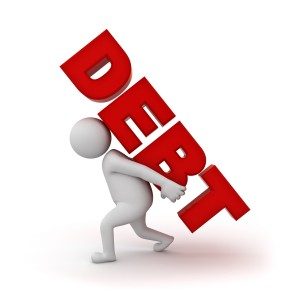5 Tips for Paying Off Debt

To Those Twenty-Somethings Out There: A Few Words On Feathering Your (Retirement) Nest
March 28, 2018
A Retirement Gender Gap
April 18, 2018Around 80 percent of Americans have some form of debt, whether through credit cards, student loans, a mortgage or other types of consumer loans. If you’re one of them and you’re looking to pay off your debt fast, here are five tips you can act on now to start making a difference.
1. Create (and Stick to) a Budget
The old adage “you monitor what you measure” has never been more true than it is with personal finance. Making a budget and tracking your spending each month is critical to assessing your holistic health. If you’re not budgeting, you could be overspending in certain areas without realizing it (think things like dining out, trips to the coffee shop or other miscellaneous expenses).
To get started, create a list of all your monthly expenses (rent/mortgage, debt payments, car/transportation, utilities, groceries, etc.). List how much you expect to spend in each area, and compare the sum of your expenses to your income. This will give you an idea of how much you should be able to allocate toward debt. As you go through the next month, challenge yourself to stick to your budget. Also see if there are items you could cut out of your budget to reallocate toward debt payments. That daily trip to the coffee shop or monthly cable bill could pay off big if put toward a loan.
2. Create Financial Goals for the Year
While a budget serves as a set of financial goals for each month, you should also have goals for the year. What do you want to accomplish in the next 12 months that will contribute to your financial health? Maybe your goal is to get your total debt down to under $50,000. Or it could be to pay off your credit card balance or student loans. Whatever your goals are, you’re more likely to meet them if you define them early on.
3. Always Pay More Than the Minimum Balance
Credit card companies and student loan providers want you to pay the minimum balance. Why? Because they make more money from your interest payments. When you pay only the minimum payment toward your debt, you’re paying mostly interest; at that pace, it takes a very long time to slowly chip away at the principal balance. Instead, always pay more than the minimum payment — even if it’s just an extra $20 a month.
4. Use the Snowball or Avalanche Methods
There are two well-known ways to approach paying off debt. Consider your personal situation and determine which method will work best for you.
- The snowball method: Make minimum payments on all debt, except the one with the smallest balance. Make the largest payment you can afford on the loan with the smallest balance. Once it’s paid off, roll that payment into the loan with the next-smallest balance.
- The avalanche method: Make minimum payments on all debt, except your highest-interest debt. Make the largest payment you can afford on the loan with the highest interest rate. Once it’s paid off, roll that payment into the loan with the next-highest interest rate.
5. Stop All Credit Card Spending
This tip might seem obvious — if you’re working on paying off debt, you should stop acquiring more. But for many people, it’s very hard to break spending habits and stop charging purchases on a credit card. Challenge yourself to stop all credit card purchases as you pay down your debt. Not only will the decreased spending mean you don’t gain new debt, but you’ll also be able to put those dollars toward your existing debts.
As you pay off your debt, consider these five tips to chip away at it faster. Carrying a certain amount of debt can be healthy, but you should always have a solid plan in place to pay it back to minimize how much you spend on interest.
If you have any questions or need help setting up a financial plan or a budget, please feel free to contact us here at Anson Analytics. You can also reach us by phone at 678.216.0795. We’d love the opportunity to serve you.


